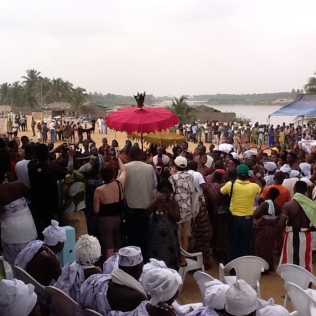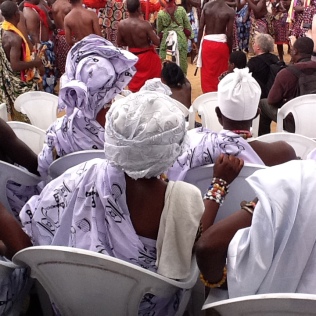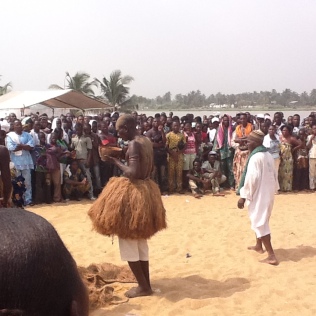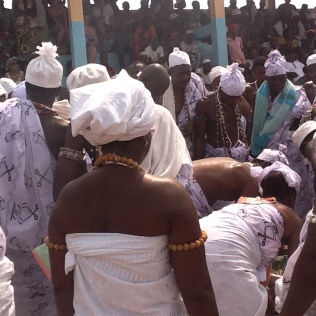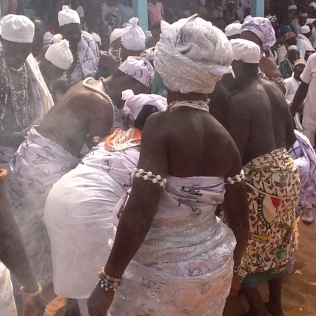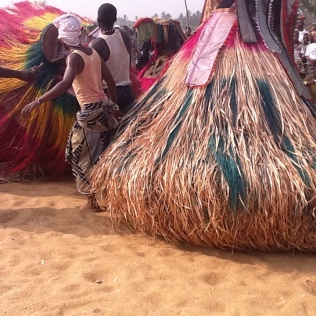Negotiating agency – ancestors and everyday concerns
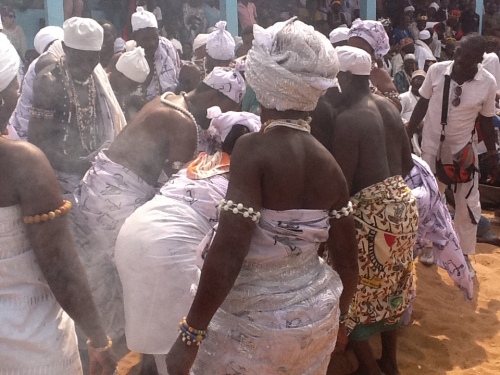 In her recent field work in coastal West African villages Marja-Liisa Honkasalo has focused her research on the mothers’ ways of shaping agency in the context of high child mortality and poverty. In this project, included in the research project Mind and the Other, her aim is to study 1) how social agency is negotiated between the living and the dead and 2) how people in the villages in demanding social situations deal with and take advantages of the presence of the dead, the ancestors. Theoretically, she is interested in the cultural negotiations of the boundary between life and death.
In her recent field work in coastal West African villages Marja-Liisa Honkasalo has focused her research on the mothers’ ways of shaping agency in the context of high child mortality and poverty. In this project, included in the research project Mind and the Other, her aim is to study 1) how social agency is negotiated between the living and the dead and 2) how people in the villages in demanding social situations deal with and take advantages of the presence of the dead, the ancestors. Theoretically, she is interested in the cultural negotiations of the boundary between life and death.
In several polytheist cosmological systems of Sub-Saharan Africa, death gives human beings an appreciated social and cosmological position. The dead continue their hereafter geographically ’here’ as Mbiti (1969) puts it. The otherworld is separated from this world mostly only by virtue of being invisible to human beings who are alive. Culturally, death is considered as an ambiguous separation and the disruption caused by death marks a boundary, which people both acknowledge and deny. A person dies and yet she continues to live being the most present in the everyday life as a sentient being e.g. being sad, glad or hungry and getting the first and best pieces of every meal and spirits. After death humans are believed to become ancestors or spirits, which all mean social elevation. The ancestors’ position gives them agency and power to influence and sometimes profoundly rule the life of the living ones. The ancestors can have an impact on fertility, illness, happiness and prosperity. In the present post-colonial social change, the ancestors seem to have gained even more significance (see Comaroff and Comaroff 1994).
 In the West African religious systems, such as Yoruba and vodon, the ontological position of the ancestors is between gods and humans. The ancestors are also an essential part of the life chain. Each child is believed to come into the world through the aid of an ancestor and these ancestral ‘sponsors’ assume critical roles as shapers of individual mind, life and identity. (Preston Blier 1995.) All newborns embed a reincarnated ancestor (joto) and thus all of them resemble a person who is deceased.
In the West African religious systems, such as Yoruba and vodon, the ontological position of the ancestors is between gods and humans. The ancestors are also an essential part of the life chain. Each child is believed to come into the world through the aid of an ancestor and these ancestral ‘sponsors’ assume critical roles as shapers of individual mind, life and identity. (Preston Blier 1995.) All newborns embed a reincarnated ancestor (joto) and thus all of them resemble a person who is deceased.
In her ethnographic work in coastal West Africa, Marja-Liisa Honkasalo’s aim is to focus precisely on the cultural intertwining between the living and the dead (see Honkasalo 2012 a and b). The ancestors are not transcendental beings ‘over there’ but ‘here’ and in several ways embedded in the lives, minds and bodies of the living. Thus clear demarcations or boundaries between them are impossible to outline, neither at bodily nor social levels. She will study how agency is negotiated between the living and the dead in a variety of cultural contexts, such as ancestral possession, death and healing rituals and everyday life concerns and worries.
In this study she continues her previous field work and will focus on the ancestral presence in the everyday life and special rituals of three villages. A six month long ethnography is carried out in the three villages where she did her previous field work 2011–2012. She will participate in the village life, observe and interview people. In addition, she will focus on healing rituals and other rituals with ancestor possession. The healing and possession rituals are videotaped. The interviews will be conducted in the local gengbe -language with an interpreter. As in the previous ethnography, the interviews will be transcribed into French or English with the collaboration of the interpreter.
Bibliography
Auge, Marc 1988. Le dieu objet. Paris: Flammarion.
Comaroff, Jean and Comaroff, John (eds.) Modernity and its Malcontents. Chicago: University of Chicago Press.
Preston Blier, Suzanne 1995. African Vodon. Chicago: University of Chicago Press.
Mbiti, John 1969: African Religions and Philosophy. London: Heineman.
Jackson, Michael 1977. The Kuranko. London: The Hurst Company.
Mendonsa, Eugene 1982. The Politics of Divination. Los Angeles: University of California Press.
Honkasalo, Marja-Liisa 2012. Kansanuskon lähteillä. Hiiskuttua 1.
Honkasalo, Marja-Liisa 2012: Between gods and mundane concerns. Paper presented at the II Nordic Seminar on Death and Dying. Helsinki.
